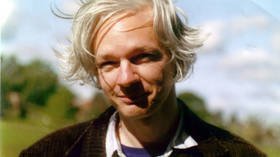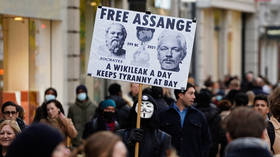Julian Assange: From liberal darling to public enemy no. 1

“The UK High Court will deliver its decision on Monday morning [January 24] about whether to permit Julian Assange to appeal the US extradition decision to UK Supreme Court,” WikiLeaks tweeted on Friday.
The December court ruling to accept the US appeal against the decision not to extradite Julian Assange enraged his supporters, who claimed it was a “travesty of justice.”
But who is Assange, and why is he in such trouble?
Political prisoner or enemy of the state?
For some, Julian Assange, the 50-year old founder of WikiLeaks, is the world’s most famous political prisoner. A fearless truth-telling journalist who has been persecuted for many years for revealing US war crimes and showing the public what went on behind the curtain. For the authorities in the US and other allied Western countries, however, he is an enemy of the state who needs to be held accountable for publishing classified information that, it is argued, has put lives at risk and endangered national security.
Computer geek
Assange was born in Townsville, Australia on July 3, 1971. His family background could hardly be described as settled. His biological parents had already separated before he was born, and by the time he was 10, his mother and the man he regarded as his father had split, too. Young Julian moved around from town to town in Australia and attended 37 different schools. That ‘never settling down too long in one place’ lifestyle remained with him as an adult.
You could say his life changed forever when his mother bought him his first PC at the age of 16. Always something of a rebel, he carried out his first computer hack as a member of a hacking group at the age of 16, and his first charges for hacking and cybercrime – 31 of them in total – came seven years later. He got off with just a fine for damages. He studied programming, mathematics, and physics at the University of Melbourne, but failed to graduate.
In 1993, when he was in his early 20s, Assange used his computer skills to help the Victoria state police investigate a child pornography ring. “My client assisted in relation to two investigations. His role was limited to providing technical advice and support, to assist in the prosecution of persons suspected of publishing and distributing child pornography on the internet,” said his lawyer Grace Morgan. “Mr. Assange received no personal benefit from his contribution, and was pleased to be in a position to assist.”
Underdog defender
Assange’s interest in cryptography intensified in the 1990s and early 2000s, becoming an obsession. His stepfather, Brett, described him as having been a “sharp kid who always fought for the underdog.” Assange started to think he might be able to use his computer skills to do just that on a global basis.
In 2006, he founded WikiLeaks as a non-profit media organization with the intention that it would be an online clearing house via which confidential information pertaining to governments around the world would be published. Assange, whose politics could be described as ‘anti-war libertarian,’ and which transcended old divisions of ‘left’ and ‘right,’ believed citizens had every right to know what their administration was up to, particularly if it involved war crimes. WikiLeaks’ stated goal was “to bring important news and information to the public.” But the founding of WikiLeaks was later to have severe personal consequences for Assange.
War crime whistleblower
In April 2010, WikiLeaks published a shocking video filmed from a US helicopter showing the killing of civilians in Baghdad, Iraq – an air assault in which two Reuters journalists were killed. And it revealed not only individual war crimes but the scale of civilian deaths in US-led conflicts in Afghanistan and Iraq, too. In October of that year, it released almost 400,000 classified US documents about the Iraq War.
Arab Spring aide
But it wasn’t all about illegal wars. Some believe that leaks of materials relating to governments in the Middle East and North Africa contributed in a major way to the so-called Arab Spring that swept a number of these regimes from power, beginning with that of President Ben Ali in Tunisia. In fact, Assange himself, in a speech to the Cambridge Union in 2011, claimed that WikiLeaks having published certain diplomatic cables had helped shape the uprisings. He said one of the reasons the cables had been published was to make it impossible for the West to continue its support of authoritarian leaders in the region.
Person of the Year
With WikiLeaks having by now become world famous on account of its well-publicized exposés, in 2010, Assange won an online reader poll and was named Time magazine’s Person of the Year. That had been preceded by Wikileaks’ scooping of The Economist’s New Media Award in 2008 and was succeeded by its founder winning the Martha Gellhorn Prize for Journalism in 2011. It’s fair to say Assange was fêted in the left-leaning mainstream media in the late 2000s and early 2010s, with The Guardian a major conduit for WikiLeaks material. But then the ‘liberal’ love-in with Julian went sour…
Alleged rapist
In August 2010, Assange traveled to Sweden for a speaking engagement, little knowing what a devastating impact this trip would have on his future life. While in Stockholm, he had sex with two women. He said the sex was consensual, but one of the women accused him of rape and the other of sexual assault. The Swedes later issued an international warrant for his arrest.
The allegations – and the seriousness of them – drove a wedge between the WikiLeaks founder and liberal public opinion. The man who had earlier been hailed as a pro-democracy activist was now defamed as a rapist. The old tenet that one is innocent until proven guilty did not appear to apply in Assange‘s case. His supporters claimed he had been set up.
Embassy refugee
The Swedish government wanted to drop extradition proceedings against Assange but, in 2018, it was revealed it had come under pressure from the UK’s Crown Prosecution Service (CPS) not to do so. The Guardian reported: “The CPS lawyer handling the case, who has since retired, commented on an article which suggested that Sweden could drop the case in August 2012.” He wrote: “Don’t you dare get cold feet!!!”.
Assange lost his battle against extradition to Sweden in 2012 and, having breached bail, took refuge in the Ecuadorian Embassy in London. Critics argued that if he really was innocent, he should have welcomed the opportunity of going to Sweden to clear his name, but Assange believed that, if he were to go to Sweden to help the Swedish police with their investigations, he would then be extradited to the US, which had already launched a criminal investigation into WikiLeaks.
Media pariah
Assange spent almost seven years holed up in the Ecuadorian Embassy. His fears that he would be extradited to the US were dismissed by his detractors as an excuse for evading the Swedish allegations, but were later proven to have been well founded. In 2016, WikiLeaks published leaked Democratic National Convention emails, leading to unfounded allegations that Assange was working for then-US presidential candidate Donald Trump and/or the Russians.
All the time he was in the embassy, Assange was subject to what can fairly be called a media campaign of denigration bordering on demonization. The one-time pro-democracy, open-government hipster-activist was now portrayed in the press as a misogynistic narcissist with a Messiah complex who had terrible personal hygiene, to boot.
International arrestee
On April 11, 2019, looking like the shipwrecked Ben Gunn from ‘Treasure Island’, with his long white beard and hair, Assange was literally dragged from the Ecuadorian Embassy by the British police, his political asylum having been withdrawn. Even though no charges had ever been brought in relation to the rape and sexual assault allegations, and the case itself had been dropped, he was charged with breaching bail in relation to the Swedish arrest warrant.
On the same day as his arrest in London, he was charged by the American authorities with conspiracy to commit computer intrusion in relation to the Chelsea Manning case, Manning being a US Army intelligence analyst and whistleblower who had disclosed to WikiLeaks nearly 750,000 classified documents. Then, a month on, Assange was hit with 17 new charges, related to a breach of the US Espionage Act. The indictment would later be expanded further.
WATCH: Moment Julian Assange is CARRIED out of the Ecuadorian Embassy in London. pic.twitter.com/OEeqmoksGr
— RT UK (@RTUKnews) April 11, 2019
Prison inmate
Since April 2019, Assange has been an inmate of the high-security Belmarsh Prison, in Southeast London. After his 50-week jail sentence for skipping bail expired, he remained incarcerated on the grounds that he was a ‘flight risk’ in relation to the US extradition request. The extradition case dragged on throughout 2020.
On January 4, 2021, Judge Vanessa Baraitser ruled against Assange’s extradition to the US over concerns about his mental health and because she was of the view he presented a suicide risk. The US appealed and he was again denied bail. Then, in December 2021, the US won its appeal, having given four assurances relating to Assange’s safety in a US jail. His supporters have questioned how the American authorities can be trusted, however, when, during Donald Trump’s tenure as president, senior CIA officials had discussed kidnapping and even assassinating the WikiLeaks founder.
The UN special rapporteur on torture, Nils Melzer, recently visited Assange in jail. He didn‘t mince his words afterwards: “The evidence is overwhelming and clear. Mr. Assange has been deliberately exposed, for a period of several years, to progressively severe forms of cruel, inhuman or degrading treatment or punishment, the cumulative effects of which can only be described as psychological torture.”
So, what next?
While appeals may still take place, the final decision as to whether to extradite Assange will be up to UK Home Secretary Priti Patel. If he is extradited and subsequently convicted in a US court, he could theoretically be sentenced to up to 175 years. Will he ever be a free man? There are genuine concerns that he will die in jail. Not surprisingly, given the length of time he has been cooped up, first in an embassy and then in prison, his health has deteriorated. His partner, Stella Moris, has claimed Assange suffered a mini-stroke due to all the stress he has suffered.
While the future remains uncertain, one thing we know for sure: Julian Assange has paid a very high price indeed for showing us what lay behind that curtain.
The statements, views and opinions expressed in this column are solely those of the author and do not necessarily represent those of RT.















